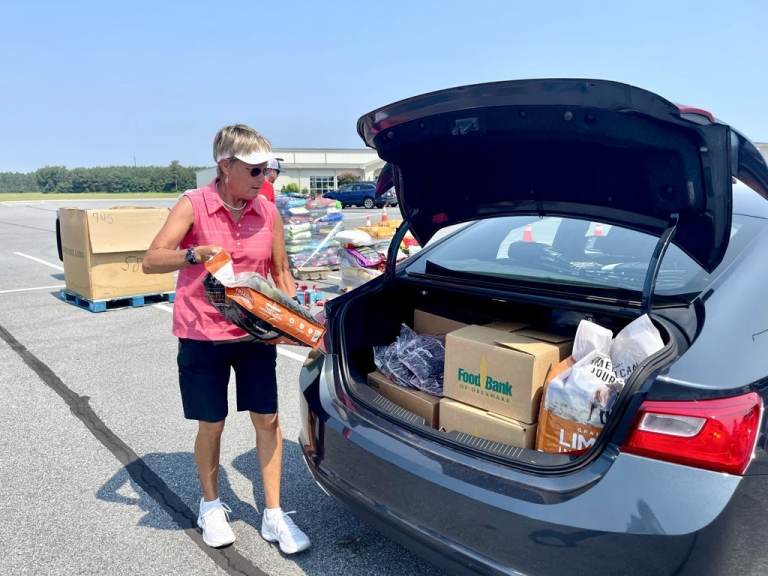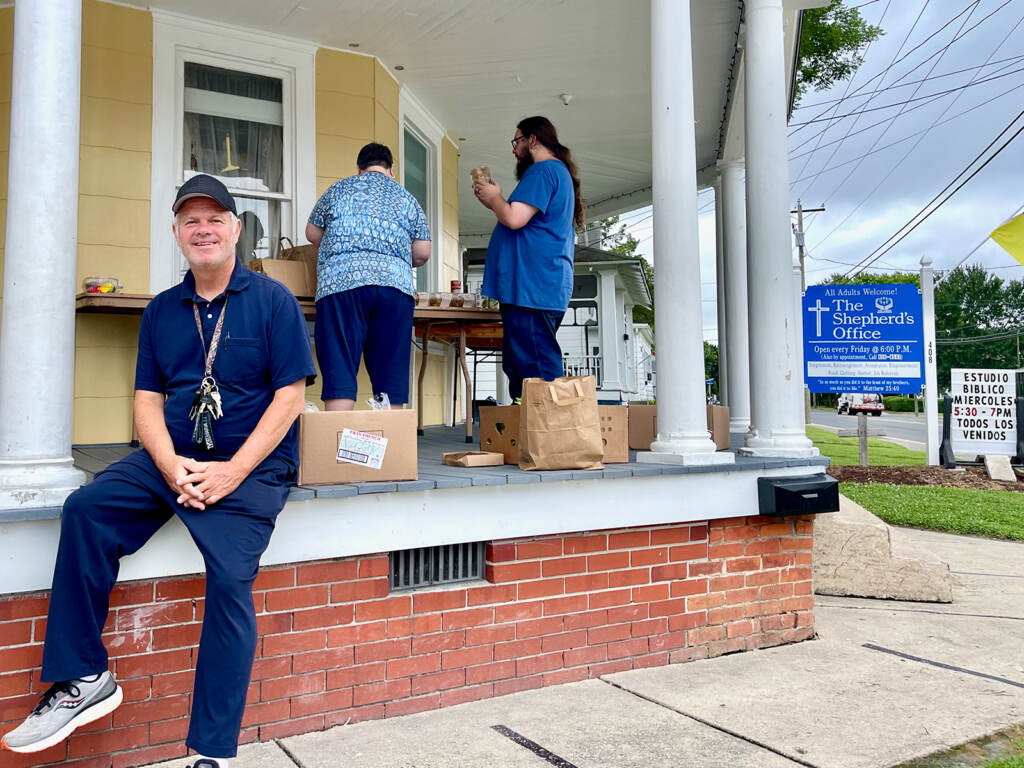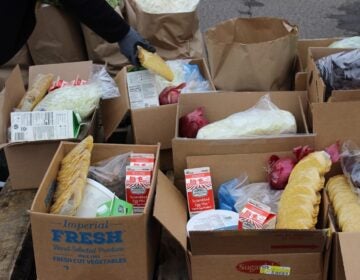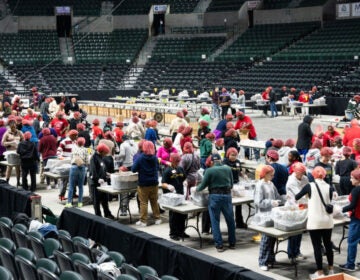Demand for food, housing assistance in Delaware grows amid inflation, pandemic concerns
Delaware is experiencing a rise in the number of residents seeking help, whether it be with housing costs, Medicaid, or food assistance.

Volunteer Judy Stout helps load a trunk with food at the Food Bank of Delaware's monthly drive-thru distribution at the Crossroad Community Church in Georgetown. (Johnny Perez-Gonzalez/WHYY)
More Delawareans are reaching out for financial help, whether it be for housing, health care, or food assistance. A number of factors, including the ongoing pandemic, inflation, and job losses, could be to blame.
In June 2021, the Food Bank of Delaware’s on-site pantry supplied 300 to 500 people on average per week, according to director of communications Kim Turner. This summer, that number has doubled, with around 600 to 800 people being serviced per week.
“We know just looking at those numbers that inflation and high gas prices are definitely impacting people’s ability to pay their bills and fuel their cars and buy groceries,” Turner said.
The food bank recently teamed up with DoorDash and Amazon to deliver food directly to homes to relieve residents of having to pay for gas, feed people who are in quarantine, and assist to people with special needs.
Amazon makes about 1,000 deliveries for the food bank every week.
Turner said that, as the number of people coming to the pantry rises, so does the number of people getting food delivered directly to their homes.
Enrollments for the Supplemental Nutrition Assistance Program are seeing a similar increase. The state’s Enhanced Food Benefits, a program that grants SNAP users an additional $95 per month for food in response to the pandemic, is still ongoing.
Jacqueline Mazariegos-Lopez, a mother and teacher from Georgetown, says paying for groceries, utilities, and gas this summer has been expensive. She said the assistance she gets from the WIC program is helpful, but not enough. The program, which offers assistance to women, infants, and children, has helped her buy formula, but it’s really all she can get for her child.
“A can is like $17, almost $18 per can, and we usually go through seven to 10 a month,” she said. To try to make up the difference, Mazariegos-Lopez has started selling homemade sweets as another source of income.
For a state with fewer than 1 million residents, those in need make up a sizable portion. According to the state Department of Health and Social Services’ Jill Fredel, 31% of Delawareans receive Medicaid, with 112,000 receiving SNAP, and 305,000 receiving Medicaid. Around 500 others applied for food benefits by the end of June 2022, Fredel said.
Delaware remains under both a state and federal public health emergency, which makes extra assistance available to those in need. But that extra help will eventually expire.
“It’s been kind of a godsend to have those enhanced benefits,” Fredel said. “The enhanced benefits, whether it’s remaining on Medicaid or the extra food benefits or waiving the co-pays for subsidized child care, those are all going to go away at some point. We just want individuals and families in Delaware to be ready for that.”
Many, like the Food Bank’s Kim Turner, are hoping that this September’s White House Conference on Nutrition, the first such conference in 50 years, will result in fresh steps to combat food insecurity on a national level.
As elected officials and advocates work to feed the hungry, others are concerned about a growing uptick in homelessness.
The Delaware State Housing Authority’s Laurie Jacobs cited a pattern in more calls for housing assistance.“Most recently, we have seen an uptick in looking for affordable housing assistance, especially with rent prices increasing and the housing market’s surging,” she said.
The most recent Point in Time count conducted by the Delaware Continuum of Care recorded 2,369 Delawareans experiencing homelessness, its highest ever number. The report said that since 2020, there are approximately three times as many families with children experiencing homelessness, an increase from 136 to 389.

Jim Martin has worked to help those experiencing homelessness in Sussex County as the director of The Shepherd’s Office in Georgetown. Since the start of the pandemic, he’s helped offer clothing and cell phones with free wifi, as well as non-perishable foods and hot meals.
His office also functions as an address people experiencing homelessness can use to put on their paperwork while applying for help.
Brian Francisco has experienced homelessness in Sussex. He’s helping volunteer at Martin’s office and says it’s been a lifesaver. “They had somebody today sign me up for food stamps. And I’ve been provided with tents and sleeping bags and propane and food and clothing,” Francisco said.
WHYY is your source for fact-based, in-depth journalism and information. As a nonprofit organization, we rely on financial support from readers like you. Please give today.






